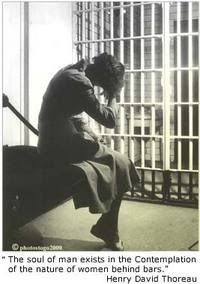From the
statement of South Dakota Governor Mike Rounds upon signing his state's abortion ban:
In the history of the world, the true test of a civilization is how well people treat the most vulnerable and most helpless in their society. The sponsors and supporters of this bill believe that abortion is wrong because unborn children are the most vulnerable and most helpless persons in our society. I agree with them.
This week, the Rev. C. Joshua Villines disagreed with Rounds' dismissal of the value of a woman's life in a column published in the Atlanta Journal-Constitution
Lacking basis, Christians fight abortion
 After spending time in women's health clinics, I have come to realize that the "most vulnerable and helpless" who need our active protection are the women and couples who are faced with the agonizingly difficult decision to terminate a pregnancy. As a Christian pastor, I strongly support protecting the right of women to make this decision. Other Christian pastors have chosen otherwise, and our division on this issue is proof that there is no Christian consensus here.
After spending time in women's health clinics, I have come to realize that the "most vulnerable and helpless" who need our active protection are the women and couples who are faced with the agonizingly difficult decision to terminate a pregnancy. As a Christian pastor, I strongly support protecting the right of women to make this decision. Other Christian pastors have chosen otherwise, and our division on this issue is proof that there is no Christian consensus here.
The far right, however, has been able to set the issue of abortion apart from all of the other controversial, life-or-death decisions we make every day. Abortion is not a special case; and I pray that the guardians of our Constitution will continue to protect our freedom to choose our own priorities in all of these weighty matters.
The beliefs or prejudices of some, regardless of who has a majority, should not be used to take the choice out of the hands of the woman who will be the main bearer, perhaps the only bearer, of the consequences of her decision.
She may bear even greater consequences than most people have thought about. Certainly there is nothing but celebration on the minds of the Godly gang at the American Life League, who on March 20 published a full-page ad in the Pierre Capital Journal to congratulate the state of South Dakota.
SOUTH DAKOTA ROCKS!
Thank you, South Dakota.
On March 6, you and your elected officials made history as the first state to create a law that bans all surgical abortions without exception.
American Life League offers our heartfelt gratitude to the people of South Dakota for electing the 73 lawmakers who passed HR1215 and Governor Mike Rounds who signed the bill into law.

Thank you South Dakota for putting a smile on the face of pro-life America.
As might have been expected, the passage of the draconian abortion ban in South Dakota is fueling similar efforts in other states. There is even concern that Ohio House Bill 228, pending since 2005, may now have a chance of passage. This bill takes the inevitable next step, stripping away the mask of concern for women perpetuated by South Dakota in titling its ban the Women's Health and Human Life Protection Act. HB 228 not only would make it a felony for a woman to have an abortion, but would criminalize her and anyone who assisted her if she crossed the state line to seek an abortion elsewhere.
The only exception to the proposed Ohio ban is an abortion performed to save a woman's life, but the bill's primary sponsor, Rep. Tom Brinkman, explains that the exception to save a woman's life is just for show anyway.
 "If we all passed the same (bill), then when they knocked out one of us they'd knock us all out," he says. "So it's our opportunity to put different ones across the plate, hoping that one will be the magic bullet."
"If we all passed the same (bill), then when they knocked out one of us they'd knock us all out," he says. "So it's our opportunity to put different ones across the plate, hoping that one will be the magic bullet."
:::
Brinkman's bill also prohibits transporting a woman across county or state lines for an abortion. Doing so would carry the same charge as an in-state abortion: first- or second-degree felonies punishable by up to 10 years in prison.
Only when it's medically necessary to save a woman's life would Brinkman's bill allow abortion. But that never happens anyway, he says.
"It's a fallacy perpetrated by the Planned Parenthood people," Brinkman says. "My doctors tell me they're never in that type of dilemma."
"Isn't that nice, coming from a non-medical person?" says Debi Jackson. "Like he would know."
Jackson heads Cincinnati Women's Services, which takes what she calls a "holistic approach" to abortion. About two-thirds of the 1,200 pregnant women who come to her every year were using some form of birth control, she says.
She thinks the tenor of current legislative dealings bode ill for women's rights.
"It's not possible for something to be living inside you and have equal rights," she says. "It's becoming quite clear that a woman is just a vessel until the child is born."
:::
So what would Brinkman say to a young girl pregnant by her uncle?
"I would just tell that 13 year old -- I know they're (going) through a traumatic situation -- number one, it's not the baby's fault," he says. "Number two, we should have adoption choices available."
Besides, if a woman or girl is raped and subsequently has an abortion, the rapist wins.
Paula Westwood, executive director of Right to Life of Greater Cincinnati, [argues] that men win and women lose when a child of rape is aborted.
"What has happened is, men know, 'Well, if I happen to rape a woman, I can have her get an abortion,' and then even if he goes to prison he's free of all responsibility," she says. "If (victims of rape) can carry the child to term, they're free from any guilt from an abortion and they're also freer because the man really has no hold on them, because even though the man fathered the child the woman has some victory over it."
Positively Pythonesque, isn't it?
However, should you think that slapping felony charges on a woman, her family or her friends for "facilitating an abortion" outside the state is an extreme provision that would be struck by the first court to consider it, consider what is happening in Missouri.
Last fall, Missouri passed a law against assisting a minor who crossed the state line to seek an abortion. When the law was challenged, Circuit Judge Charles Atwell issued a temporary injunction against its enforcement pending a ruling by a higher court. Atwell ruled that while the law lacked protections for free speech by persons who had no intent to assist a minor in obtaining an abortion, the statute in itself was constitutional.
Atwell said the law is unconstitutional, as it infringes on the right to free speech and due process for people who provide information and counseling to girls, and said providing information on reproductive rights would be protected. However, he said the law would be constitutional if it were interpreted with his judicial restraints. Atwell said that a lawsuit only could be brought against someone if they were familiar with the law and if they knew the girl being counseled was under 18 and also was trying to circumvent the consent requirement. "[T]he court, with substantial trepidation, finds that (the law) is constitutional" with those restrictions in place, Atwell wrote.
How one feels about parental involvement laws is irrelevant here; what matters is the legal principle being upheld. The state of Missouri has the right to control its citizens' access to abortion in any other state, regardless of that other state's own laws. So much for the argument that if Roe is overturned and abortion is criminalized in some states, women still will be free to travel to less restrictive states for abortion care.
The South Dakota ban specifies penalties only against physicians or other persons who actually might perform an abortion. However, as Lynn Paltrow and Charon Asetoyer explain in South Dakota's New Murderers, that does nothing to protect women from prosecution. If abortion becomes illegal, women are subject to prosecution under other statutes already in existence.
If the unborn are legal persons, as numerous South Dakota laws assert, then a pregnant woman who has an abortion can be prosecuted as a murderer under already existing homicide laws.
Farfetched? Not at all.
Prosecutors all over the country have been experimenting with this approach for years. In South Carolina, Regina McKnight is serving a 12-year sentence for homicide by child abuse. Why? Because she suffered an unintentional stillbirth. The prosecutors said she caused the stillbirth by using cocaine, yet, they did not charge her with having an illegal abortion -- a crime that in South Carolina has a three-year sentence. Rather, they charged and convicted her of homicide -- a crime with a 20- year sentence. They obtained this conviction in spite of evidence that McKnight's stillbirth was caused by an infection.
Thus far, South Carolina is the only state whose courts have upheld the legitimacy of such prosecutions. But in fact, women in states across the country, including South Dakota, have already been arrested as child abusers or murderers -- without any new legislation authorizing such arrests. In Oklahoma, Teresa Hernandez is sitting in jail on first-degree murder charges for having suffered an unintentional stillbirth. In Utah, a woman was charged with murder based on the claim that she caused a stillbirth by refusing to have a C-section earlier in her pregnancy.
If women are now being arrested as murderers for having suffered unintentional stillbirths, one should assume that in South Dakota's post-Roe world intentional abortions would be punished just as seriously.
Even the most ardent anti-choice activists are reluctant to talk about what will happen to women who have abortions when abortion is once again a crime. Amazingly enough, it seems that most of them haven't even thought about it [video link]. But we know what happened to women the last time around.
The earlier laws never stopped abortion, but they did make it more dangerous. As police and prosecutors stepped up their enforcement in the 1940s and 1950s, they pushed good, safe abortion providers out of practice. As a result, abortion got more deadly. Many women who went to illegal abortionists were blindfolded and had abortions in secret places. Many survived, but some died and many more were seriously injured.
In the years immediately before Roe vs. Wade, hospitals around the country had separate septic abortion wards for women bleeding, injured and infected because of illegal abortions. Many of these patients had tried to abort by themselves.
Chicago's Cook County Hospital housed almost 5,000 women per year in its septic abortion wards.
Deaths due to illegal abortion approached 50 percent of the nation's total maternal mortality, according to a U.S. Department of Labor study titled "Maternal Mortality in 15 States.''
In countries where abortion is illegal today, 25 percent to 50 percent of all maternal mortality is due to illegal abortion.
[...]
How will new criminal abortion laws be enforced?
In the past, prosecutors focused on those who performed abortions, though women were arrested and punished, too. Police and medical staff interrogated women suspected of having abortions. Suspects included women in the midst of a miscarriage.
If abortion is made illegal, medical personnel could again be coerced into collecting information from patients under the threat of losing their medical licenses.
Clinics could again be raided by police, patients captured and forced to endure coercive gynecological examinations as police search for evidence.
Women who seek medical care after an abortion could be questioned, arrested and required to testify in court.
These are not fictional nightmares. All of this happened routinely when abortion was a crime.
Of course it did. Doctors still practicing today tell us that it happened all the time. And the worshipers of a more heartless God than mine can hardly wait for it to happen all over again. Because for them, a fantastical idolatry of the "unborn" overshadows the value of any woman on earth.

[Title image from Women Doing Time]




 print page
print page



